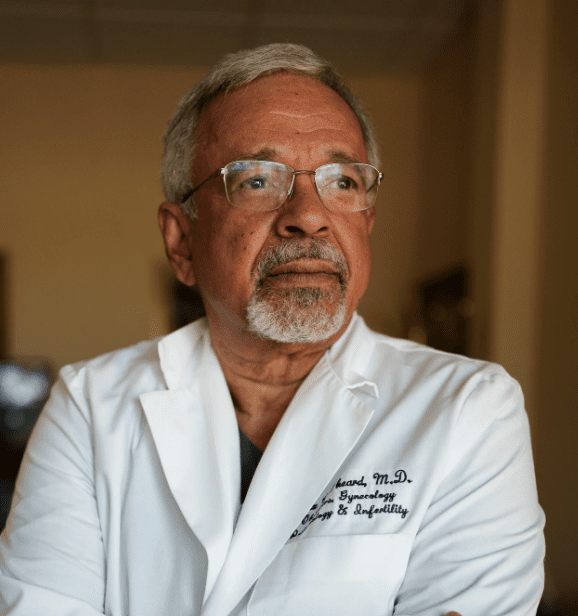
New Mexico Provider Trying to Save Abortion for Texas Women
The Washington Post
By Jada Yuan
May 10, 2022
The New Mexico Provider Trying to Save Abortion for Texas Women
This 73-year-old physician is on a mission to make his clinic a refuge for women’s health care on the border.
Franz Theard plies his trade in the sunniest of shadow worlds. His innocuously named Women’s Reproductive Clinic of New Mexico is hidden in plain sight, down a slope in a strip mall, neighboring a Subway and a State Farm office, in a border town of a border town. It’s less than a mile from the Texas state line, amid the sprawl of El Paso, which is itself a crossing to Ciudad Juárez in old Mexico, as folks here call it, surrounded by fireworks stores and delicious tacos and the desert beyond.
Here, this 73-year-old Haitian American OB/GYN and abortion provider sits in windowless exam rooms, handing patients pills to end their pregnancies, skirting Texas law by a trick of New Mexico geography. (And, if the protesters stationed outside during all business hours are to be believed, charting his path to hell.) He is alone on the southern edge of America, at the westernmost corner of the country’s second biggest state. And if Roe v. Wade is overturned, Theard soon may be one of the only abortion providers in the western United States.
“You’re going to go to your favorite hospital and blame the cramps on — tell them you’re having a miscarriage,” Theard (pronounced thay-ARD) told 32-year-old mother of three Cynthia Mena, explaining that she’d need a shot of medication because pregnancy termination can trigger her blood type to create antibodies that could attack future pregnancies. “Just don’t tell them about the pill. I recommend that you don’t,” Theard went on. “They’ll treat you like you killed Jesus or something.” (Texas is full of antiabortion OB/GYNs who often shame their patients, Theard explained.)
Gov. Greg Abbott (R) has been an unstoppable force behind Texas’s S.B. 8, a.k.a. the “Heartbeat Act,” a law imposing some of the tightest abortion restrictions in the country. Ever since it went into effect in September, Theard’s clinic has had an influx of patients from East Texas who’ve suddenly found themselves without options in their own state. Many of them, like Mena, went to clinics in big cities like Dallas, Houston, Austin or San Antonio, only to get turned away because a gestational heartbeat could be detected on an ultrasound, which usually happens around six weeks — often before most women know they’re pregnant. Providers have been incentivized to stick to the law, because it also contains provisions for people to sue anyone — from providers to Uber drivers — who “aids and abets” an illegal abortion.
Theard thought S.B. 8 would go the way of 2013’s H.B. 2, which banned abortion after 20 weeks and which Abbott (then Texas’s attorney general) fought tirelessly to keep in place, before it was struck down by the U.S. Supreme Court in 2016. “We figured the same thing was going to happen. They were just rattling their sabers. I felt confident that this can’t last,” said Theard. “It doesn’t make any sense, people putting bounties on doctors. But it’s here and it looks like it’s gonna stay.”
Now he’s made it his mission to persuade the women of East Texas to come west instead of going to Oklahoma, Louisiana, Kansas or Arkansas — all states with mandatory 24- to 72-hour waiting periods, and where getting an appointment may take two to three weeks because of the sudden increased demand from Texas. And in some of those states, the laws are getting increasingly more strict. “Thank God we’re in New Mexico,” which has some of the most liberal abortion laws in the country, says Theard. That demand will only increase if Roe v. Wade is overturned and Texas bans abortion outright, as is expected.
Just because Texas is making it almost impossible to get an abortion doesn’t mean demand is down. Studies released in March showed that the law didn’t stop Texas women from getting abortions — they just went out of state. Last year, Theard says, his clinic treated 1,845 abortion patients, in the middle of the pandemic. And that’s before S.B. 8 started driving patients his way. In April he did 260 abortions, up 85 from the same month last year; half were from East Texas. Theard estimates that 95 percent of all of his patients are Hispanic.
Theard opened his office on weekends to make it easier for patients to come from East Texas and got his staff on board with the cause. “I don’t need the money, to be honest with you,” he told me, when I visited his clinic on a Saturday in late March. Fliers supporting Beto O’Rourke in his governor’s race against Abbott were displayed around the waiting room. “People ask me, ‘What’s your goal? What do you want to do? I am so left-wing, liberal Democrat. I would like for Santa Teresa, New Mexico, to be almost like continuing to get abortion pills in El Paso — to be known as the exception to the S.B. 8 rule in Texas. Anybody who gets pregnant, you don’t really have to leave the state of Texas to get your pill.” (Technically, you do have to leave Texas.)
read full article
